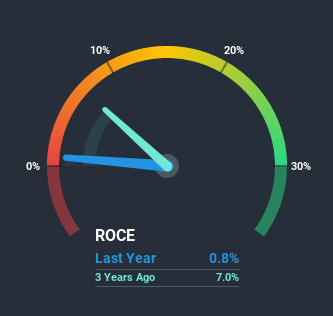Stock Analysis
- India
- /
- Hospitality
- /
- NSEI:MHRIL
Returns On Capital At Mahindra Holidays & Resorts India (NSE:MHRIL) Paint An Interesting Picture

If we want to find a stock that could multiply over the long term, what are the underlying trends we should look for? Firstly, we'd want to identify a growing return on capital employed (ROCE) and then alongside that, an ever-increasing base of capital employed. Basically this means that a company has profitable initiatives that it can continue to reinvest in, which is a trait of a compounding machine. However, after briefly looking over the numbers, we don't think Mahindra Holidays & Resorts India (NSE:MHRIL) has the makings of a multi-bagger going forward, but let's have a look at why that may be.
Return On Capital Employed (ROCE): What is it?
For those who don't know, ROCE is a measure of a company's yearly pre-tax profit (its return), relative to the capital employed in the business. The formula for this calculation on Mahindra Holidays & Resorts India is:
Return on Capital Employed = Earnings Before Interest and Tax (EBIT) ÷ (Total Assets - Current Liabilities)
0.0079 = ₹585m ÷ (₹88b - ₹14b) (Based on the trailing twelve months to December 2020).
Therefore, Mahindra Holidays & Resorts India has an ROCE of 0.8%. Ultimately, that's a low return and it under-performs the Hospitality industry average of 3.1%.
See our latest analysis for Mahindra Holidays & Resorts India

In the above chart we have measured Mahindra Holidays & Resorts India's prior ROCE against its prior performance, but the future is arguably more important. If you're interested, you can view the analysts predictions in our free report on analyst forecasts for the company.
What Can We Tell From Mahindra Holidays & Resorts India's ROCE Trend?
When we looked at the ROCE trend at Mahindra Holidays & Resorts India, we didn't gain much confidence. To be more specific, ROCE has fallen from 6.0% over the last five years. And considering revenue has dropped while employing more capital, we'd be cautious. If this were to continue, you might be looking at a company that is trying to reinvest for growth but is actually losing market share since sales haven't increased.
What We Can Learn From Mahindra Holidays & Resorts India's ROCE
From the above analysis, we find it rather worrisome that returns on capital and sales for Mahindra Holidays & Resorts India have fallen, meanwhile the business is employing more capital than it was five years ago. And, the stock has remained flat over the last five years, so investors don't seem too impressed either. With underlying trends that aren't great in these areas, we'd consider looking elsewhere.
One more thing, we've spotted 1 warning sign facing Mahindra Holidays & Resorts India that you might find interesting.
While Mahindra Holidays & Resorts India may not currently earn the highest returns, we've compiled a list of companies that currently earn more than 25% return on equity. Check out this free list here.
If you decide to trade Mahindra Holidays & Resorts India, use the lowest-cost* platform that is rated #1 Overall by Barron’s, Interactive Brokers. Trade stocks, options, futures, forex, bonds and funds on 135 markets, all from a single integrated account. Promoted
Valuation is complex, but we're helping make it simple.
Find out whether Mahindra Holidays & Resorts India is potentially over or undervalued by checking out our comprehensive analysis, which includes fair value estimates, risks and warnings, dividends, insider transactions and financial health.
View the Free AnalysisThis article by Simply Wall St is general in nature. It does not constitute a recommendation to buy or sell any stock, and does not take account of your objectives, or your financial situation. We aim to bring you long-term focused analysis driven by fundamental data. Note that our analysis may not factor in the latest price-sensitive company announcements or qualitative material. Simply Wall St has no position in any stocks mentioned.
*Interactive Brokers Rated Lowest Cost Broker by StockBrokers.com Annual Online Review 2020
Have feedback on this article? Concerned about the content? Get in touch with us directly. Alternatively, email editorial-team (at) simplywallst.com.
About NSEI:MHRIL
Mahindra Holidays & Resorts India
Operates in the leisure hospitality sector.
Adequate balance sheet with moderate growth potential.

